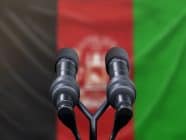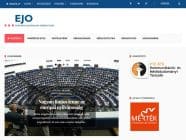The phrase “We all are journalists now” sounds like a truism. The phenomenon of citizen journalism is widely understood and accepted as a legitimate part of the global media system. Yet, despite the blurring boundary between professional and amateur reporters, the question remains: who is a “real” journalist today?
Henrik Örnebring, now professor of Media and Communication at Karlstad University in Sweden has conducted a study, while still at the University of Oxford, based on a series of in-depth interviews with professional journalists. It was set to answer the question: How is what you do different from what citizen journalists do? It attempted to find out how professional journalists see themselves and their professional occupation as compared with the activities of amateur reporters equipped with smartphones and internet connection. The findings were mixed. On the one hand, professionals used traditional claims to maintain their authority. On the other, rapid technological and economic changes force them to reevaluate the idea of journalistic individuality and independence.
Reporters from six European countries were interviewed: Germany (12), Estonia (11), Italy (11), Poland (10), Sweden (10) and the UK (9). The sample was relatively small, contained a total of 63 respondents and was based on one-third quota. The scheme included media professionals from different career stages (early-, mid-, and later-career) and media platforms (print, broadcast, and online). However, it could not always be strictly followed. For example, in case of Italy it was difficult to recruit early-career respondents, and sometimes interviewees worked across different platforms.
The research outlined three core elements of journalistic professional project: expertise, duty, and autonomy. Expertise referred to the set of skills and knowledge to allow journalists to claim authority as professionals. Duty related to the idea of profession being “more than just a job” and having a wider social responsibility. Autonomy was understood as self-governance and professional freedom of journalists from the state and market forces. Further, the respondents were asked to elaborate on what in their opinion set them apart from the citizen journalists.
The evaluation of citizen journalists work differed by country. Professionals in Italy, Poland, and Estonia demonstrated utterly negative attitudes while a few journalists from Germany, Sweden, and the UK have offered “unqualified positive assessments”.
Some findings were predictable and along the lines of previous research. The notion of expertise was indeed prominent as a demarcation line between professionals and amateurs. The ability to filter information using so-called editorial judgement was named one of the uniquely journalistic skills by the respondents. In other words, it is the ability to decide on behalf of the audience what constituted valuable information and what didn’t. As one British interviewee put it: “Blogging and all the citizen journalists is all very fine but without the robustness of an editorial approach, an editorial selection, I just think it wouldn’t work.”
Similarly, the idea of journalistic duty was considered an important factor of journalistic authority. Interestingly, the respondents believed their duty is to follow ethical codes and professional principles, especially the practice of verification, rather than more abstract idea of social responsibility. A German mid-career reporter commented on the journalistic duty to provide accurate information: “As a journalist you know who said what, when, why and how, that’s what you learn in your traineeship, that’s a hard school. A so-called citizen journalist doesn’t have that.”
A more surprising finding concerned the claim to autonomy. Traditionally, journalistic autonomy has been deeply embedded in relative freedom of individual reporters from the institutional constraints of news organizations. It was also one of the reasons why journalism never became a profession like medicine or law. Professional openness was a valued part of journalism’s ideology linked to the freedom of speech. Today, technological and economic changes within media industry make the collective nature of news-making process more visible. The authority of media professionals comes from collaboration with colleagues and involvement in editorial work. The recognition of collectivity becomes a “form of occupational closure” and allows professional reporters to claim legitimacy vis-à-vis citizen journalists. In that sense, amateurs “are not subjected to the same editorial quality control that professional journalists are” simply because they are not part of a media organization and collective editorial process. And it is only through their assimilation into a professional institution that they can become “real” journalists.
Source:
Henrik Örnebring (2013) Anything you can do, I can do better? Professional journalists on citizen journalism in six European countries. The International Communication Gazette.
Photo credit: James Williamor / Flickr Cc
Tags: autonomy, Blogging, Citizen journalism, Citizen Journalists, duty, expertise, Henrik Örnebring, Journalism, journalistic, Karlstad University, Media research, survey, what is journalism














































